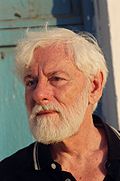WHEN THE 1967 Middle East crisis started, Eshkol -- then both Prime Minister and Minister of Defense -- indeed hesitated to act. Israel was threatened by three Arab armies, America's consent to an Israeli attack was not assured. The crisis lasted for three weeks, and the anxiety of the Israeli population intensified from day to day.
Eshkol looked like an unlikely war leader. At the height of the crisis, he decided to make a radio speech to lift the spirits of the nation. He read from a prepared text -- prepared too much. An adviser had improved the manuscript, changing some words. When he reached these words, Eshkol stumbled. It sounded like indecision, and immediately a public conviction was formed: Eshkol must go, or at least give up the Defense Ministry.
A group of women (nicknamed "the Merry Wives of Windsor") demonstrated in the streets, Eshkol surrendered and Moshe Dayan became Minister of Defense.
The army, which for years had been superbly armed and prepared by Eshkol, won a crushing victory. Dayan, the picturesque one-eyed ex-general became the great victor, the dream of women around the world, though his contribution had been minimal.
When it all ended, Eshkol's stature in the public mind remained low. While the case can be made that he was the real victor, all the glory went to the glamorous generals. Israel became a militarist state, the generals became national heroes, Dayan, who was quite incompetent, was venerated.
AND THEN, less than two years after the war, Eshkol suddenly died. These were the fateful two years, in which the surprising results of the war had to be dealt with.
There was no real debate. My friends and I advocated the creation of a Palestinian state and found no support -- neither in Israel nor throughout the world. When I visited Washington DC, everybody was adamantly against it. Even the Soviet Union (and the Israeli Communist party) took up the idea only years later.
One of the arguments against it was that the "Arabs of the West Bank" (God forbid calling them Palestinians) wanted to return to the King. So I went to see all the prominent local leaders in the West Bank. At the end of every conversation I asked them point blank: If you had the choice between returning to Jordanian rule or creating a Palestinian state, what would you choose?" Every one of them said: "a Palestinian state, of course."
When I brought this up in a Knesset debate, Dayan, then still the Minister of Defense, answered that I was lying. When I brought it up again in a debate with the Prime Minister, Eshkol supported his minister.
But then Eshkol did something that only an Eshkol could do: his adviser for Arab affairs called me and asked for a meeting. We met in the Knesset Member's cafeteria. "The Prime Minister has asked me to find out on what you base your assertion," he told me. I recounted my conversations with the various Arab leaders in the occupied territories. He drew up a meticulous protocol and summed it up: "I agree with MK Avnery on every detail. However, we both agree that a Palestinian state without East Jerusalem as capital is unthinkable. Since the government has decided to keep East Jerusalem in any peace agreement, the idea of a Palestinian state is irrelevant." (I have just transferred this document to the National Archive.)
The extreme right already demanded the annexation of all the occupied territory to Greater Israel, but they were then far from power, and few took them seriously.
What remained was the vague "Jordanian Option." The idea was to return the West Bank to King Hussein, on the condition that he let us have East Jerusalem.
That was a crazy idea, resulting from a total ignorance of Arab reality. The king was a scion of the Hashemite family, the family of the prophet Muhammad. The idea that he would give up the third holiest place of Islam, the place from which the Prophet himself had ascended to heaven, was ludicrous. But Eshkol, like all the other ministers, had no idea about Islamic or Arab affairs.
THE ONLY Israeli Prime Minister who knew Arab Palestinians was hardly mentioned in Drucker's series: Moshe Sharett.
Sharett was Israel's second Prime Minister. When Ben-Gurion decided to abdicate and settle in the Negev, Foreign Minister Sharett was chosen by his party to succeed him. It took Ben-Gurion about a year to decide that he wanted to be Prime Minister after all, so he returned to the Defense Ministry, and after some time to the Prime Minister's office.
Sharett was the opposite of Ben-Gurion in almost every respect. It is no accident that Drucker hardly mentions him. He was considered weak, indeed negligible. While Ben-Gurion was decisive, bold and even adventurous, Sharett was considered a coward and widely despised.
(Note: You can view every article as one long page if you sign up as an Advocate Member, or higher).





